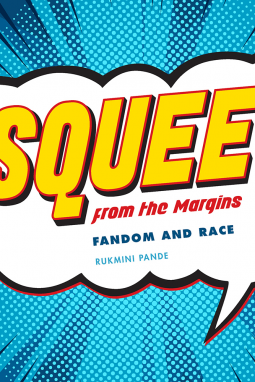
Squee from the Margins
Fandom and Race
by Rukmini Pande
This title was previously available on NetGalley and is now archived.
Send NetGalley books directly to your Kindle or Kindle app
1
To read on a Kindle or Kindle app, please add kindle@netgalley.com as an approved email address to receive files in your Amazon account. Click here for step-by-step instructions.
2
Also find your Kindle email address within your Amazon account, and enter it here.
Pub Date Dec 01 2018 | Archive Date Dec 01 2018
University of Iowa Press | University Of Iowa Press
Talking about this book? Use #SqueefromtheMargins #NetGalley. More hashtag tips!
Description
Rukmini Pande’s examination of race in fan studies is sure to make an immediate contribution to the growing field. Until now, virtually no sustained examination of race and racism in transnational fan cultures has taken place, a lack that is especially concerning given that current fan spaces have never been more vocal about debating issues of privilege and discrimination.
Advance Praise
“Rukmini Pande’s work is a crucial and timely intervention in the field of fan studies that calls for a re-examination of how the field constructs fans and the spaces fans inhabit. This work will enable current and future generations of fan scholars to reflect more critically on our relationship with race and postcolonialism, and how whiteness frames our understanding of fan culture in an increasingly globalized network of fandom.”—Bertha Chin, Swinburne University of Technology
“Rukmini Pande’s Squee from the Margins is a groundbreaking book on race and fandom. Well-written and accessibly erudite, it is a crucial work that moves fan studies forward as a field. I’m immediately adding it to my syllabus as required reading.”—Paul Booth, editor, Companion to Media Fandom and Fan Studies
Available Editions
| EDITION | Other Format |
| ISBN | 9781609386184 |
| PRICE | $67.50 (USD) |
| PAGES | 256 |
Links
Featured Reviews
Thank you to NetGalley and University of Iowa Press for the free ARC in exchange for an honest review.
Squee from the Margin by Rukmini Pande analyzes race in fandom. It goes from how fans of color interact with fandom, to how fandom interacts with characters of color and their positive and negative portrayals in popular media.
Pande examines the intersection of race and fandom in several different facets, including fanfiction, kink memes, gif reactions, popular OTPs, and newer diverse movies and shows. In all of this, she also details her interview responses from fans of color.
It is a bit dry, but as an academic book, that’s to be expected. The topics covered here are things I’ve never seen discussed academically, and I think fandom culture is definitely something that needs examining.
 Brian F, Educator
Brian F, Educator
A fascinating read that offers a much needed argument that fan studies must examine the impact of whiteness and assumptions that fandom is a phenomenon most associated with white, middle class people. Panda reveals the complexities of fandom and the negative influences on fandom of racist, homophobic and misogynistic thought which seem antithetical to the texts many fans gravitate towards. It is a brilliant piece of scholarship that furthers the conversations in fandom studies and will inspire future work.
 Sandra K, Reviewer
Sandra K, Reviewer
As an academic who is also part of fandom, I have a particular interest in books like this one. I've found that there are two kinds of books: those that are written for other academics and those that are written to disseminate the findings of research to the broader public. This book is the former. Although it will appeal to members of fandom who are interested in the intersection of race and fandom, it will be hard for the casual reader to pick up.
Being the product of the author's dissertation, the theoretical background and methodology were clear and thorough. I do have to wonder about the response bias of individuals who self-select to participate in a study such as this one. It seems more likely that a person of color for whom race has played a significant role in their participation in fandom will be more interested in this study than those for whom their race has not been a major or problematic issue. This could lead to support for the author's theories that might not exist in the general public.
Having said that, there is a lot to chew on in this book. There are several tracks in the approach taken. The first is the role that erasure of race has taken in research on fandom. Second is the role race plays in the experience of fandom from the participant's perspectives and third is the role the race of the character plays in engagement by the fandom as a whole. This book might have been made stronger if the author had written two books: One that focused an academic eye on the first and second, and another that presents a more "layperson" view on the second and third. This topic is one that fandom should be engaging with, but the academic language prevents access to this important viewpoint.
Overall, although I found the writing in this book to be very challenging at times (as one would expect from a dissertation), the information presented opened several avenues for criticism of research methodology in the field and opened my eyes to the way race (of both the fan and the character) may impact participation in fandom.
 Hillary J, Librarian
Hillary J, Librarian
As a member of various fandoms for over 20 years, I've often wondered at the issues regarding race. Since lately, fandom has been getting more into "purity" and "toxicity" issues, this book addresses a critical question. How are fans of color treated? How do they get along? Are they being taken seriously as producers and consumers of fandom work? More and more fans of color have been appearing at cons, the most visible level of fandom, but there does seem to be a backlash, even in a world where you can hide anything about yourself behind a username. However, the notion that one needs to hide their race behind a username is a toxic one in itself. A well needed book, I hope to see more research on this in the future.
Readers who liked this book also liked:
Karen Thompson Walker
General Fiction (Adult), Literary Fiction, Sci Fi & Fantasy
Jodi Picoult; Jennifer Finney Boylan
General Fiction (Adult), Literary Fiction, Women's Fiction










